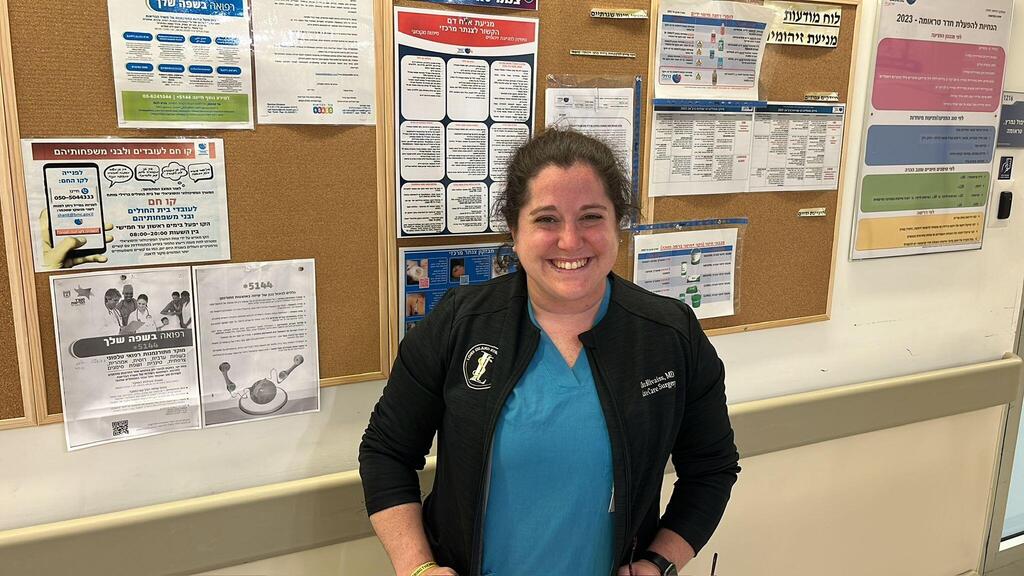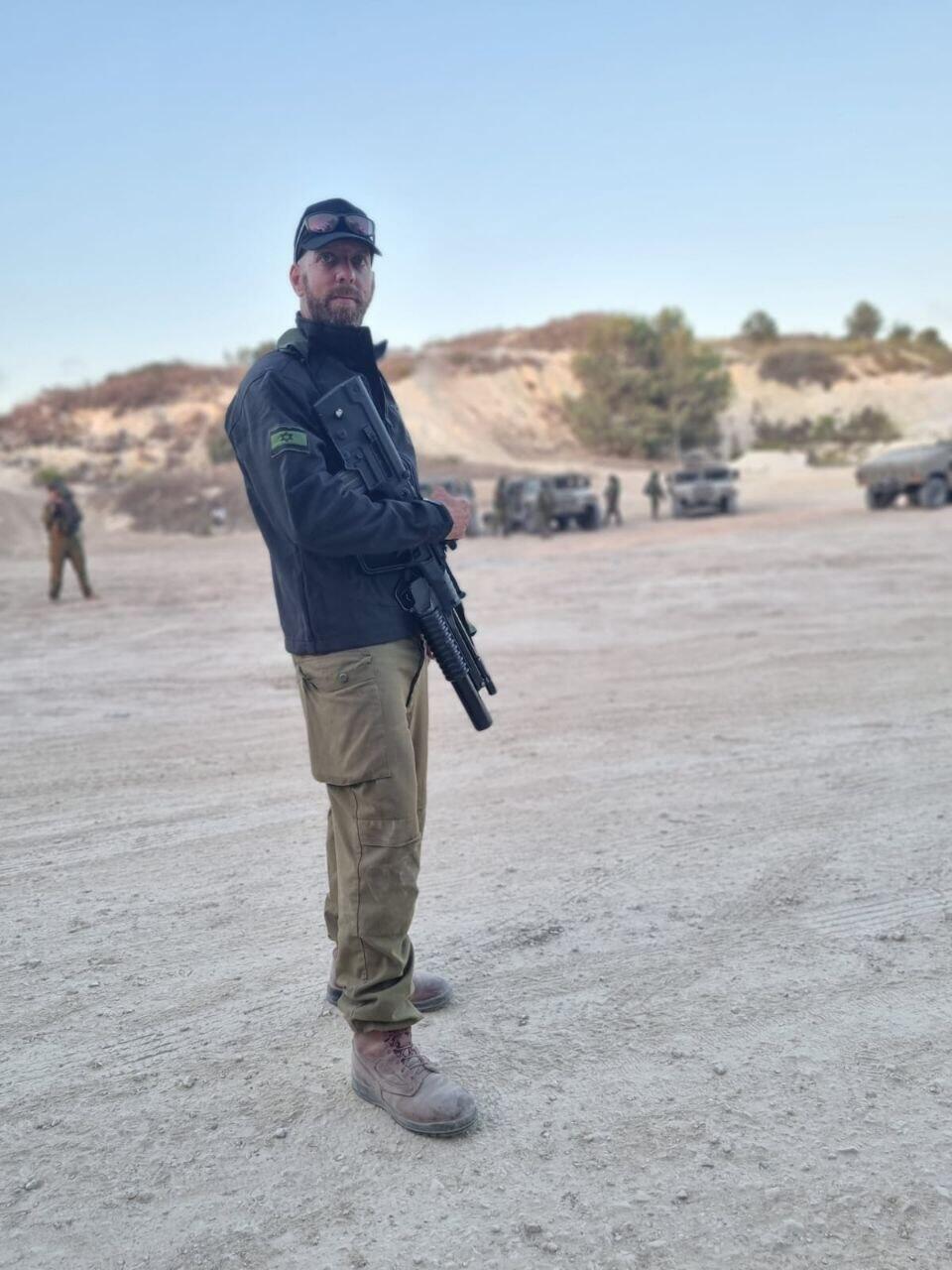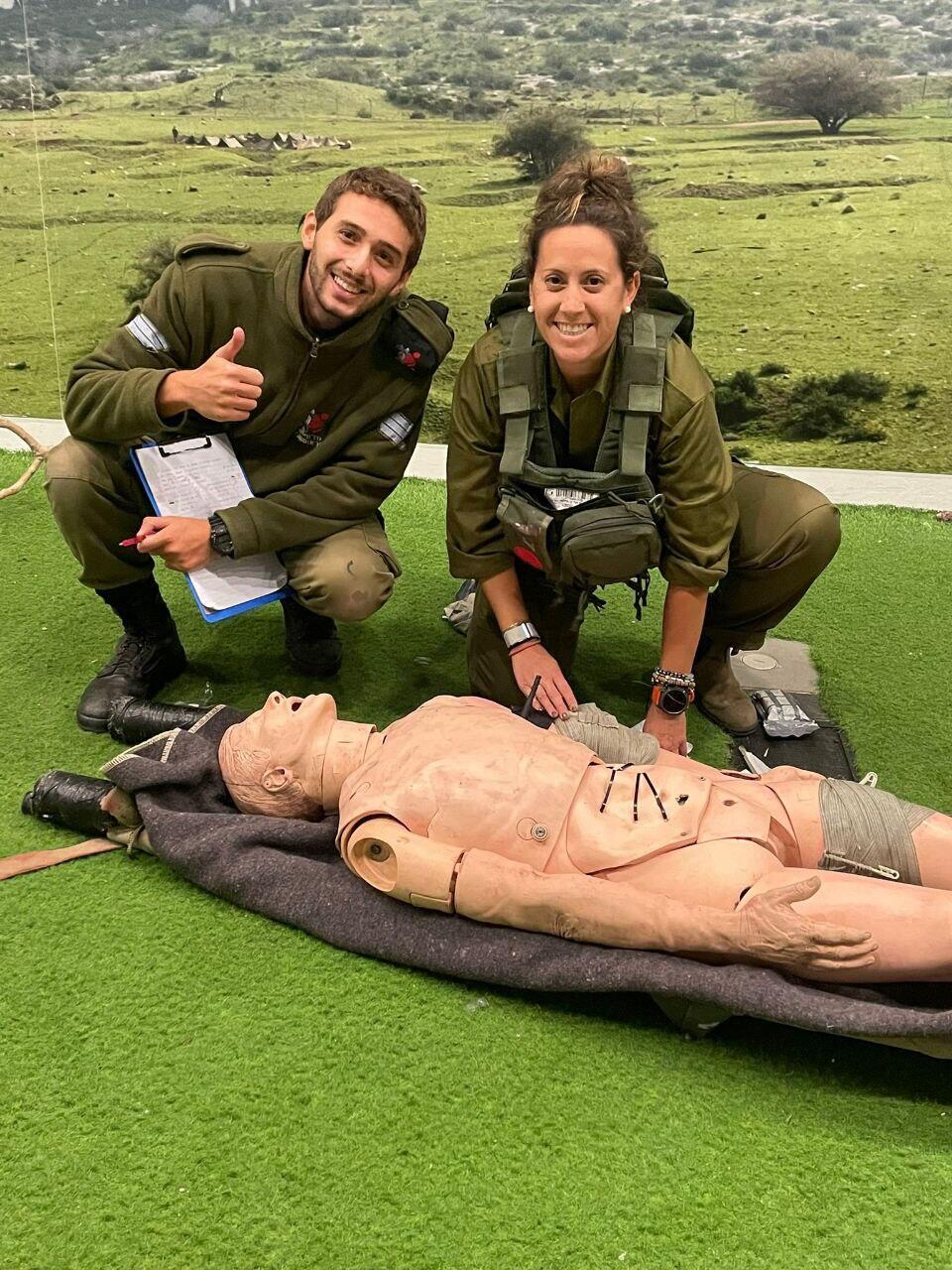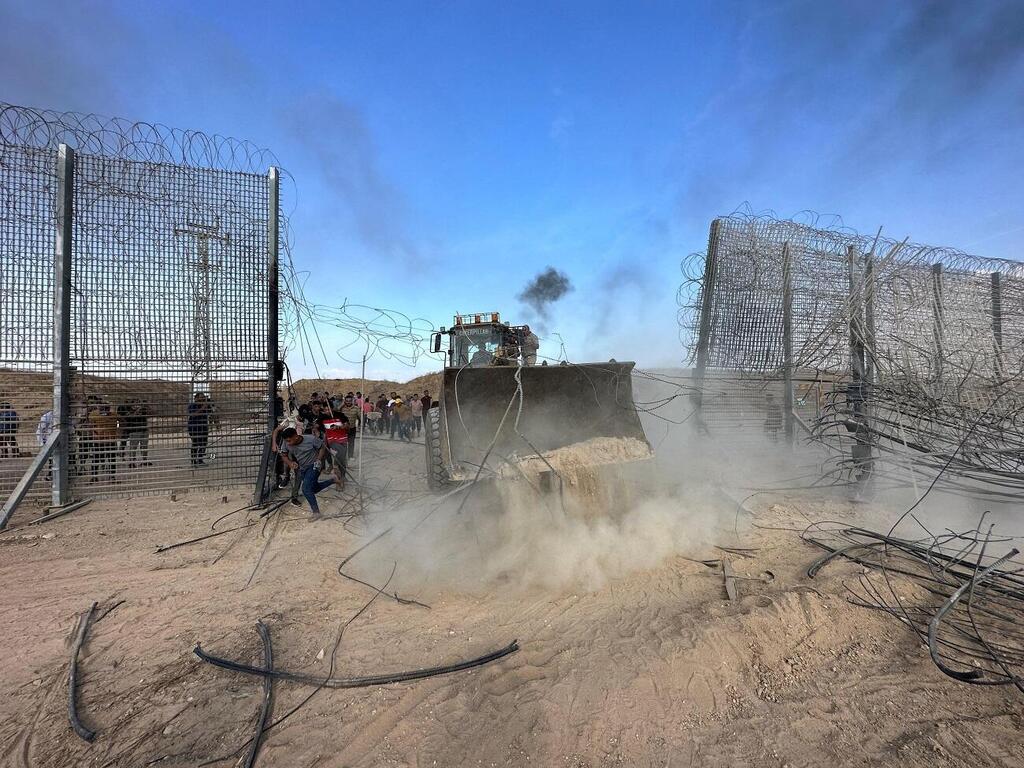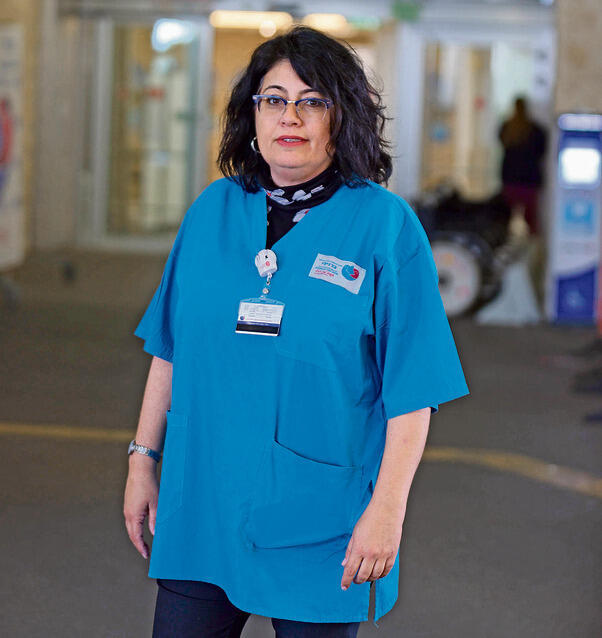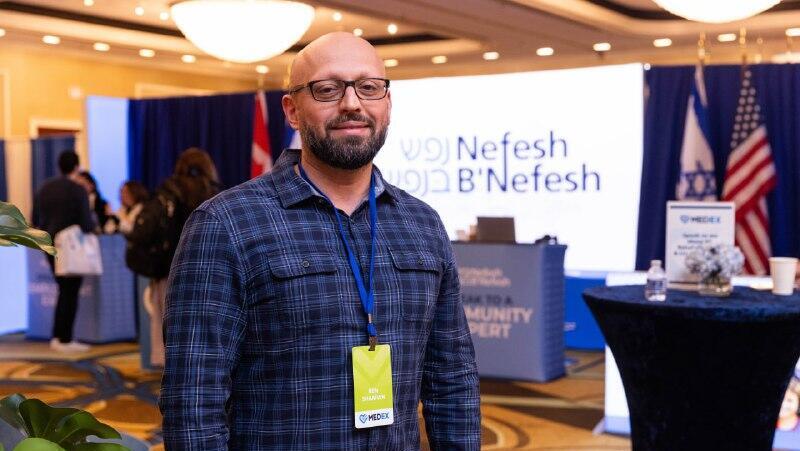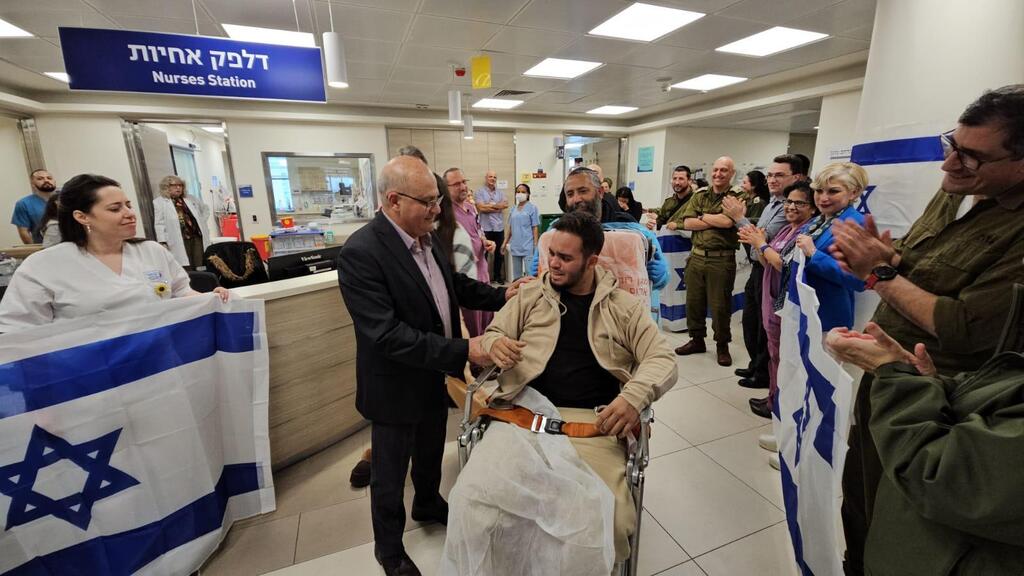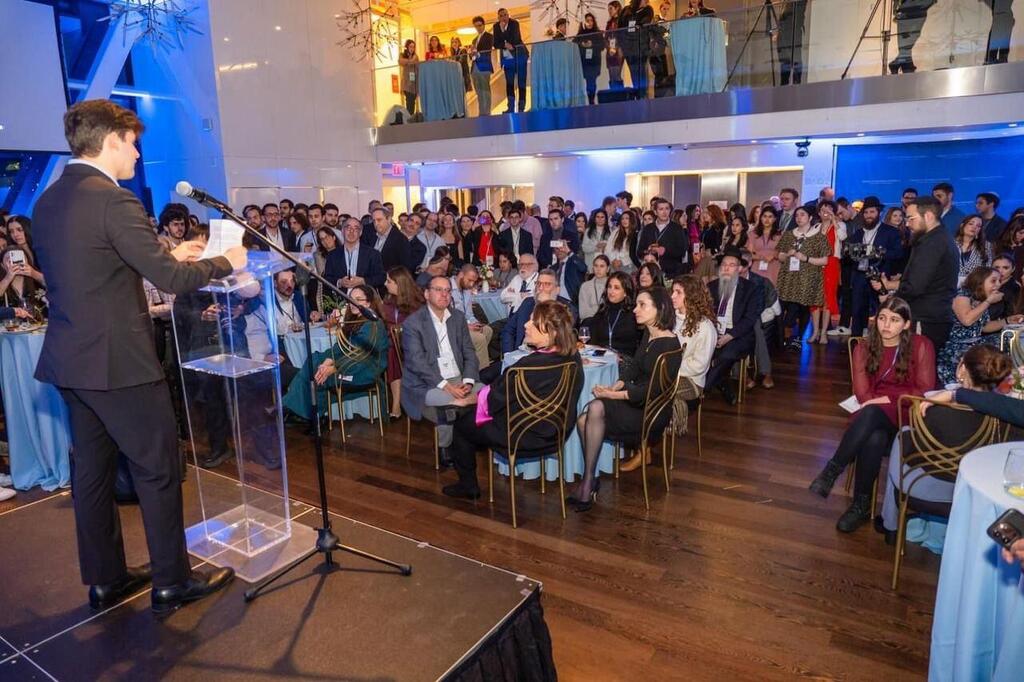Several weeks ago, the cynical Israeli witnessed a particularly strange sight: hundreds of well-established medical professionals from around the United States rushed to a conference in New Jersey, aimed at helping them move to another country - one that is at war, after having suffered one of the worst disasters it has ever known. Some say that Zionism is in crisis, but for the many Jews who came to the annual MedEx conference organized by Nefesh B'Nefesh, the Aliyah Ministry, and the Health Ministry - Israel is the main avenue in mankind’s never-ending search for purpose and meaning.
As one continues to try to understand why, especially now, the same movement appears in response: a strong hand on the heart, and the simple statement – “it comes from here”. And just like that, the layer of cynicism that engulfs that skeptical Israeli is suddenly replaced with hope.
"I was devastated to see what's happening in Israel," says Dr. Chava Blivaiss, a trauma surgeon in an intensive care unit, who came from New York in October to volunteer at the Barzilai Medical Center in Ashkelon. "It was a mistake. They needed an ER doctor, and I'm a surgeon. But it was an oversight that changed my life. I was supposed to be there for two weeks, but instead, I stayed for two months. Then I came back to Israel again, this time to volunteer at Ziv Hospital in Safed."
Dr. Blivaiss's supervisor in New York, a Jewish doctor himself, paid her salary during her entire time in Israel, explaining that he saw it as a contribution to the war effort. Dr. Blivaiss helped treat the wounded, and also trained soldiers on how to better handle field injuries after having identified some repeated mistakes among the wounded. During that time, she lived in Ashkelon under incessant rocket attacks. At the end of the second week, she decided that she would make Aliyah. "I felt at home, as if I am more myself in Israel," she explains.
Dr. Blivaiss says that the wounded soldiers she met in the hospitals deeply inspired her. One of them, she recalls with somber eyes, was suffering from severe pain, yet he played his guitar in the hospital for other wounded soldiers, in an effort to raise their spirits as well. In another case, there were twenty soldiers who had sustained severe injuries from shrapnel running from room to room in their underwear to see that their comrades were okay, not caring for themselves for one moment.
She specifically remembers the story of Dvir Fischer, who had a bullet penetrate his neck and exit without hitting any vital organs. "It was a real miracle, which made me cry," she says. "The difference of one millimeter and the outcome would have been different."
These cases, she says, brought back her passion for medicine. "In New York, I was starting to lose my aspiration for what I was doing," she explains. "I did one hundred percent of what was necessary, but my heart wasn't present. Only while in Israel I realized it was not what I wanted to do, but where I wanted to do it." As for the social polarization in Israel, Dr. Blivaiss said that she did not feel it at all, on the contrary, she only experienced unity. Maybe that is because she was in the right places. "There is no better place than Israel for the Jews," she states. "Before I left New York I was afraid to wear a necklace with the Star of David, but now I proudly wear a necklace with a map of Israel that I received at Barzilai Medical Center. I am no longer the 'Jew with the trembling knees'."
"An earthquake for American Jews"
According to Nefesh B'Nefesh, some 480 medical professionals attended this year's MedEx event, which works to ease the bureaucracy throughout the Aliyah process. While at MedEx, participants begin converting their medical licenses and specialty licensing, prior to arriving in Israel and undergo interviews with representatives of all the Israeli medical institutions.
The expectation is that most of these participants will make Aliyah in the next six months to two years, after only 65 physicians made Aliyah in 2023 – a disappointing figure that could largely be attributed to the judicial reform and related protests.
During the event, an agreement was signed between Nefesh B'Nefesh, the ministry and the Health Ministry with the support of The Marcus Foundation, the Jewish Federations of North America (JFNA– UIA) and The Jewish Agency for Israel, launching an international program that will advance the Aliyah of approximately 2,000 doctors from around the world in the next five years. In addition, the partners announced that for the first time, a MedEx conference will be held in Paris, which will be the program’s inaugural encounter with the Jewish communities of France and Belgium.
Ronen Fuxman, Director of Nefesh B’Nefesh’s new International Medical Aliyah Program, clarifies that this is an extensive process, in which some may not necessarily immigrate, adding that each of these Olim are assets, especially due to Israel’s manpower shortage. He says that this shortage will soon be amplified, as many doctors who arrived from the USSR in the 1990s will soon reach retirement age, and Israel’s “Yatziv Reform” will come into effect, disqualifying many medical schools abroad. He hopes that now alongside the Health Ministry’s growing involvement, 2024 will bring Israel many doctors, also compensating for last year.
“October 7 was not only an earthquake for us, but also for American Jews," says Fuxman. He says that though the conference was primarily attended by Orthodox Jews, he also feels an awakening among liberal Zionist Jews in the U.S.. "On shabbat I attended the Central Reform Synagogue in New York, and unlike previous years, I barely had a place to sit," he says. Rabbi Angela Buchdahl told me it's been like that since October 7. The congregation opened the ceremony with a prayer for the safety of the hostages and the soldiers. It's something that never happened before."
Fuxman has been a member of the organization for eight and a half years, but this time the conference is different for him. On October 7, he was drafted as a reservist, and served on the northern border together with many friends.
"I told myself that I was lucky to be returning from reserves to work at a meaningful organization, which is extremely holistic and not just focused on paperwork," he explains. Although he is expected to return to reserve duty shortly, he shares, "friends from the reserves say that they don't know what to do with themselves, that it's hard for them to go back to normal life. If I didn't have this job, I don't know how I would manage."
"You realize that without the Iron Dome, you’d be dead."
Nurse Liba Cohen (36) from New York says she visited Israel for the first time at age 18, and immediately fell in love. From time to time, she returned to Israel for extended periods, one lasting for two years during which she volunteered for National Service. In 2017, she competed in the Maccabiah triathlon and placed third in her age group. After October 7, she once again came to Israel, in order to volunteer as a medic in the IDF. "I love festivals," she says. "In the past, I also went to nature parties during the Sukkot holidays. I had a lot of friends at the Nova Festival, and if I was in Israel on October 7, I would have most probably been there too."
Following the massacre, Cohen looked for flights to Israel and searched to identify how she could help and found an opportunity to volunteer in the IDF as a medic. She did not arrive empty-handed: no less than 17 bags and suitcases boarded the plane with her, full of donations from American Jews for IDF soldiers. She cleared customs after hours of waiting, went through an accelerated course at the Ariel Sharon training base, and from there continued to the Tze’elim army base where she served as a medic in the clinic.
"They told me I was crazy, but I wasn't scared," she says. "Israel is the safest place in the world. It’s more dangerous to be in New York, because of the anti-Semitism. They won't do anything to me because I know self-defense. I even have a shirt that says 'curve your antisemitism'."
She is no stranger to the dangers in Israel. While living in Jerusalem, in 2017, she witnessed a fatal car ramming attack, near her home in Armon Hanatziv, while she was on her way to the supermarket. She returned home terrified and did not even go shopping, telling her friends that she was afraid to go outside. They told her she had to go back because her feelings of fear were what the terrorists wanted. "I went out again, because I didn't want to let terror win," she exclaimed.
She says that she was only scared once during the war, not while she was in the south, but rather when she was visiting Tel Aviv. "There was a siren, but there was nowhere to go, and there were rockets and interceptions right above me," she describes. "I started crying, because you realize that without the Iron Dome, you’d be dead. And despite the fear, I still wanted to be there."
Liba is not the political type. She does not usually participate in protests, and she also admits that she does not understand enough to discuss the demonstrations surrounding the 2023 judicial reform. Despite this, she arrived at MedEx in New Jersey after attending a demonstration for the hostages, fully dressed in protest symbols. "It's not political," she states. "It may be a demonstration, but the goal is to remind the world that they are still in Gaza. The terrorists could have taken me too. The more we talk about it, the more people will understand."
The money is in the U.S., the heart is in Israel
Since coming back from the war to New York, Liba gets startled by the sirens of the New York Fire Department, but that is not what will prevent her from making Aliyah. The main obstacle for her and for many like her are the finances: in the U.S., nurses earn a much higher salary than in Israel. The pay gap, according to her, reaches tens of thousands of dollars annually. "America is easier financially, but every time I leave Israel, I feel that I am leaving my heart behind," she shares. "The U.S. doesn't have the Jewish spirituality that Israel has. I'm not religious, and in the U.S. if you're not religious, you don't feel 'connected'. In Israel even if you are not religious, the tradition is present, the holidays are everywhere, you feel that it’s Shabbat. It’s heartwarming. Every time I returned to New York I felt that I had to make Aliyah, and then I got used to the comforts of life in the U.S.. Now with the war, that has changed."
And there are also other difficulties in making Aliyah. The main one, perhaps, is bringing the physicians not only to the hospitals in the Tel Aviv and Jerusalem areas, but also to the periphery. "Ashkelon, for me, is not a peripheral area," explains Dr. Gili Givati, Deputy Director of Barzilai Medical Center. She admits that even with hundreds of doctors at the conference, it is not easy to bring them to the south.
On October 7, Israel received resounding, heartrending evidence of Barzilai Medical Center’s importance, as it served as one of the main medical centers treating the largest mass casualty incident the country had ever known. While calling for hundreds of medics, the teams had to work in a special underground complex, during incessant rocket attacks. Later, the hospital quickly recruited many volunteers from abroad, such as Dr. Blivaiss, who persevered even after the hospital suffered two direct hits. They helped treat the injured, and trained teams in emergency medicine, since in the U.S., because of the extensive use of weapons, doctors have a lot of cumulated experience relevant to treating war casualties.
"Shared fate is critical," says Dr. Givati, and tells just how much the hospital has invested in having doctors from abroad on call in case of emergency. But there is still a long road ahead in trying to convince these medical professionals to settle permanently in Ashkelon, even in a nice apartment facing the sea. "In the past, we hardly received any interest from these doctors," she says.
"Today there is a greater understanding of the need to work not only at Tel Aviv Sourasky Medical Center or in Sheba Tel Hashomer Medical Center, but also in hospitals that are close to the southern and northern borders. The hospitals in the Gaza Envelope should be anchors in the area, because alongside education and leisure, residents want their communities to have good health institutions as well. It is not sustainable for the State to continue to direct all the newcomers to live in Tel Aviv or Jerusalem. Strengthening the periphery is critical. We can’t give up on the wonderful areas that the land of Israel has to offer,” she added.
We need an incentive that will make people understand that this is an area that is beneficial, good and worthwhile to live in
Dr. Givati hopes that she will be able to recruit at least two doctors at the conference, who specialize in emergency medicine, and would be able to teach at Ben Gurion University as well. "The State does not provide an incentive to come to Ashkelon, rather the opposite," she says. "How can they tell new Olim to come to Ashkelon when they know that during an emergency situation, they would be at a greater risk than others? We need an incentive that will make people understand that this is an area that is beneficial, good and worthwhile to live in."
Minister of Aliyah and Integration, MK Ofir Sofer, hopes that one of the solutions to the problem will be a NIS 300,000 grant to doctors who immigrate to Israel through MedEx and commit to working for three years in the T’kuma region (Gaza border region). The preference, according to the T’kuma Directorate, is to attract doctors specializing in Family Medicine, Pediatrics, Gynecology, Geriatrics, and Psychiatry. "We are responsible for their integration, taking care of their absorption into local communities and ensuring their children have schools for example," he says. "Medicine in the periphery is our frontline and Barzilai, Soroka, Ziv, Poriya, and Nahariya Medical Centers are the pinnacles. Anyone we manage to bring will be a blessing for the regions, as there is a real need to strengthen medicine in the periphery. This is a wonderful and meaningful opportunity."
Another problem is the difficulty in bringing Reform and Conservative Jews to Israel, where Orthodox Judaism predominates. Minister Sofer, from his standpoint says that he would like to see them as well, but admits it is more difficult. “It is true that there have always been certain demographics that make Aliyah more than others,” he says. “As American Jewry has never been fully united in its support of Israel and some remain more affiliated than others.”
From Iran to Israel
Dr. Benhour (Ben) Shamian was born in Iran but left for the U.S. with his family when he was 14 years old, when life for Jews became unbearable there. Now, at 44, while living in Brooklyn with his wife and two young children, he is about to fulfill a dream. "I have always wanted to make Aliyah," he says, and recounts how he insisted on studying medicine at the Technion in Haifa. "My children want to go to Israel for every vacation we take. They are connected to the country, and I enjoy it as well."
Shamian talks enthusiastically about the food and the weather in Israel, but his connection to the country comes from a deep emotional place, which is difficult for him to express in words. "I just feel it inside," he says. "It's not just based on religion, since religion can be practiced anywhere, but Judaism is only in Israel. Israelis are also warm people, they speak 'IN YOUR FACE'. It’s also the constant use of the word, 'brother’. Even the Israelis I meet here who are enthusiastic about the U.S., say after a week of being here, 'there is no place like Israel’."
After October 7, he says, the connection only got stronger. He explains "that same day I spoke with my wife and told her, ‘this is the sign’.” The United States is huge, so you may not feel antisemitism, but it exists in every corner, and is experienced every day and every hour. Jews live here thinking that everything is fine and that they are safe, but they are living in a bubble. And if all the Jews bring their money, thoughts, and talents to Israel, it will be stronger. It is admittedly easier to stay in Brooklyn and donate money, and it will also help a little, but it's just not the same. And if everyone keeps thinking like that, there will be no progress, and Israel will not return to what it used to be."
When asked what has changed in Israel, he talks about the social divide in the past year. "I don't want to be political, but these demonstrations are not the way," he sighs. "I always thought that it doesn't matter if you are secular or religious, in Israel everyone is together. Am Israel Chai - but before that, the country must be united."
The writer was a guest of Nefesh B'Nefesh


